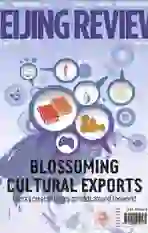Scaling Financial Heights
2016-04-27ByJiJing
By+Ji+Jing
A team of four graduate students majoring in finance at the Beijing-based Renmin University of China (RUC) won seventh place at the 13th CME Group Trading Challenge in March, the first time a Chinese team has made it to the “top 10” in the competition.
Su Bei, the leader of the RUC team, at- tributed their success to the diverse academic backgrounds of his team members.
“All four members have had internships or work experience in different areas of finance, including private equity, securities and insurance companies as well as banks. Therefore, we could pool our expertise together in the com- petition,” Su told Beijing Review.
Su, for instance, has an international education background. He studied economics at the University of Toronto in Canada before enrolling in his masters program at RUC. He developed an interest in finance at high school, when he began to delve into trading on Canadian and U.S.equity markets. He started to dabble in international commodity futures trading when he was an undergraduate.
Guo Juan, another team member, worked at a private equity firm for several years and the experience she accumulated enabled her to be more confident making decisions in trading.
In addition, as she studied insurance for her undergraduate program, she developed an acute sense of numerical and mathematical reasoning, helping her analyze more effectively.
An intense challenge
Although the competition is a long-distance trading challenge, the process is still pretty intense. Contestants are supposed to trade frequently. Sometimes they need to finish the purchasing and selling of a specific futures category within a few seconds in order to avoid losses and gain profits.
Contestants need to utilize the knowledge they have learned in class to analyze the macroeconomic situation when making a trading decision.
“Through the analysis of a large amount of data, we found that the price of crude oil fluctuated the most over the previous few months. Therefore crude oil made up the greatest proportion of purchases, because it was more likely to make a profit,” said Su.
In addition to keeping an eye on economic fundamentals, contestants should also closely follow unexpected economic and political occurrences in the world in order to make adjustments to their investment structure.
“For instance, when trading crude oil, we need to take into consideration major news events happening every day, such as the crude oil storage data published every Wednesday, U.S. nonfarm payroll employment, and the situation in the Middle East,” said Guo.
“As the futures market is characterized by high risks, a competent trader should possess a gift for trading as well as sharp observational abilities in order to make timely adjustments,”Guo added.
Although the team has made a breakthrough in this years competition, Su still has some regrets. As contestants have to trade according to the Eastern Time Zone of the United States, the time available for trading often falls between 10 p.m. and midnight in Beijing.
“Its difficult to keep a clear mind so late in the day; as a result, we have missed a lot of trading opportunities,” said Su.
A promising sector
Since China joined the World Trade Organization in 2001, domestic financial institutions have had an increasingly high demand for financial majors, in order to expand their businesses and be more competitive in the international market. Financial education has therefore taken off in China. Finance is now one of the most popular majors for university students, owing to the job opportunities it portends and the lucrative salaries on offer in the sector.
More than 380 institutions of higher learning offer such majors in China, ranging from specialized finance universities such as the Central University of Finance and Economics to comprehensive universities that host schools of finance or economics, such as RUC.
The RUC School of Finance has attached great importance to internationalization. It has encouraged students to participate in various international student exchange activities in recent years, such as the Model United Nations, the Forum for American-Chinese Exchange at Stanford and the Cornell International Real Estate Case Competition.
Huang Wenbin, Vice Chairman of the school, said not only had his students gone abroad to participate in international activities, but also foreign students were invited to his school, to carry out exchanges with their Chinese counterparts.
Huang said the school has put an emphasis on improving students spoken English, so as to cultivate cross-cultural talent. Competent teachers from Beijing Foreign Studies University were invited to teach English at the school during the weekend and one third of the schools teachers have a doctors degree from overseas universities.
“I hope all the students will be able to go abroad for exchange programs during their study here, in order to learn more about developed countries in Europe and North America and broaden their horizons,” Huang told Beijing Review.
“The School of Finance doesnt simply focus on theories but also emphasizes practice. For instance, the international finance course has taught us how to make international investment arrangements. Financial professionals were invited to teach classes on what its like to make investments in the real world,” said Zhu Yanqi, a team member.
Thanks to the professional training received from the school, the four team members, who will graduate this year, have all found promising and well-paid jobs in the financial sector. Two of them are going to work for a private equity firm, one is going to work for a state-owned commercial bank and one is choosing between several offers.
